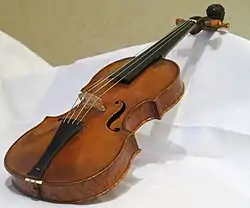fele
English
Etymology
From Middle English fele, from Old English feola, fela (“much, many, very”), from Proto-Germanic *felu (“very, much”), from Proto-Indo-European *pélh₁u (“many”). Cognate with Scots fele (“many, much, great”), Dutch veel (“much, many”), German viel (“much, many”), Latin plūs (“more”), Ancient Greek πολύς (polús, “many”). Related to full.
Adverb
fele
- (dialectal or obsolete) Greatly, much, very
- 1589, Richard Hakluyt, The Principall Navigations, Voiages, and Discoveries of the English Nation, […], London: […] George Bishop and Ralph Newberie, deputies to Christopher Barker, […], →OCLC:
- For they bring in the substance of the Beere / That they drinken feele too good chepe, not dere.
Adjective
fele (comparative feler, superlative felest)
- (dialectal or obsolete) Much; many.
- 1513, Gavin Douglas, Eneados:
- This cruel monstre, […] Infect with fell venoum;
- 1589, Richard Hakluyt, The Principall Navigations, Voiages, and Discoveries of the English Nation, […], London: […] George Bishop and Ralph Newberie, deputies to Christopher Barker, […], →OCLC:
- So fele shippes this yere there ware / That moch losse for vnfreyght they bare.
- So fele ships this year there were / that much loss for unfreight they bore.
- So fele shippes this yere there ware / That moch losse for vnfreyght they bare.
Hungarian
Pronunciation
- IPA(key): [ˈfɛlɛ]
Audio (file) - Hyphenation: fe‧le
- Rhymes: -lɛ
Adjective
fele (not comparable)
- half (of the)
- A fele gond az enyém. ― Half (of) the trouble is mine.
Derived terms
- felerészben
Noun
fele
- third-person singular single-possession possessive of fél: its half, half of…
- A pénz fele az enyém. ― Half of the money is mine.
Declension
| Inflection (stem in long/high vowel, front unrounded harmony) | ||
|---|---|---|
| singular | plural | |
| nominative | fele | — |
| accusative | felét | — |
| dative | felének | — |
| instrumental | felével | — |
| causal-final | feléért | — |
| translative | felévé | — |
| terminative | feléig | — |
| essive-formal | feleként | — |
| essive-modal | feléül | — |
| inessive | felében | — |
| superessive | felén | — |
| adessive | felénél | — |
| illative | felébe | — |
| sublative | felére | — |
| allative | feléhez | — |
| elative | feléből | — |
| delative | feléről | — |
| ablative | felétől | — |
| non-attributive possessive - singular |
feléé | — |
| non-attributive possessive - plural |
felééi | — |
Further reading
- (noun sense; a derivative of fél (“its half”)): (2): fél in Bárczi, Géza and László Országh. A magyar nyelv értelmező szótára (‘The Explanatory Dictionary of the Hungarian Language’, abbr.: ÉrtSz.). Budapest: Akadémiai Kiadó, 1959–1962. Fifth ed., 1992: →ISBN
- (adjective): fele in Bárczi, Géza and László Országh. A magyar nyelv értelmező szótára (‘The Explanatory Dictionary of the Hungarian Language’, abbr.: ÉrtSz.). Budapest: Akadémiai Kiadó, 1959–1962. Fifth ed., 1992: →ISBN
- (postposition; dialectal alternative form of felé (“towards him/her/it”)): (1): felé in Bárczi, Géza and László Országh. A magyar nyelv értelmező szótára (‘The Explanatory Dictionary of the Hungarian Language’, abbr.: ÉrtSz.). Budapest: Akadémiai Kiadó, 1959–1962. Fifth ed., 1992: →ISBN
Latin
Pronunciation
- (Classical) IPA(key): /ˈfeː.le/, [ˈfeːɫ̪ɛ]
- (modern Italianate Ecclesiastical) IPA(key): /ˈfe.le/, [ˈfɛːle]
References
- fele in Charles du Fresne du Cange’s Glossarium Mediæ et Infimæ Latinitatis (augmented edition with additions by D. P. Carpenterius, Adelungius and others, edited by Léopold Favre, 1883–1887)
Middle English
Etymology 1
Inherited from Old English fela, felu, from Proto-West Germanic *felu, from Proto-Germanic *felu.
Alternative forms
Pronunciation
- IPA(key): /ˈfɛːl(ə)/
Determiner
fele
- Many, much; an indefinite large number of or quantity.
- c. 1375, “Book II”, in Iohne Barbour, De geſtis bellis et uirtutibus domini Roberti de Brwyß […] (The Brus, Advocates MS. 19.2.2), Ouchtirmunſye: Iohannes Ramſay, published 1489, folio 5, verso, lines 240-242; republished at Edinburgh: National Library of Scotland, c. 2010:
- James off Dowglas þat wes ſyne / Þ[at] yheyt þan wes bot litill off my[ch]t / And oþir fele folk foꝛſye in fy[ch]t […]
- James of Douglas was next; / [he] was then only weak in power / and many other people, mighty in war […]
Derived terms
References
- “fēle, indef. num.”, in MED Online, Ann Arbor, Mich.: University of Michigan, 2007.
- “fēle, adv..”, in MED Online, Ann Arbor, Mich.: University of Michigan, 2007.
Etymology 2
Inherited from Old English fǣle, from Proto-West Germanic *failī, from Proto-Germanic *failijaz.
Alternative forms
Pronunciation
- IPA(key): /ˈfɛːl(ə)/
References
- “fēle, adj.”, in MED Online, Ann Arbor, Mich.: University of Michigan, 2007.
Etymology 3
A back-formation from felen (“to feel”).
Pronunciation
- IPA(key): /ˈfeːl(ə)/
Noun
fele (uncountable) (rare, Northern)
References
- “fẹ̄le, n.(3).”, in MED Online, Ann Arbor, Mich.: University of Michigan, 2007.
Neapolitan
Etymology
From Vulgar Latin *felem m or f, from Latin fel n.
References
- AIS: Sprach- und Sachatlas Italiens und der Südschweiz [Linguistic and Ethnographic Atlas of Italy and Southern Switzerland] – map 140: “il fiele” – on navigais-web.pd.istc.cnr.it
- Giacco, Giuseppe (2003) “fèle”, in Schedario Napoletano
Norwegian Bokmål

a violin
Pronunciation
- IPA(key): /feːle/, [ˈfeː.lə]
Noun
fele f or m (definite singular fela or felen, indefinite plural feler, definite plural felene)
- a violin
- a fiddle; any form of stringed instrument
Synonyms
- (violin): fiolin
Derived terms
References
“fele” in The Bokmål Dictionary.
Norwegian Nynorsk
Pronunciation
- IPA(key): /feːle/, [ˈfeː.lə]
Noun
fele f (definite singular fela, indefinite plural feler, definite plural felene)
- a violin
- a fiddle; any form of stringed instrument
Synonyms
- (violin): fiolin
Derived terms
References
“fele” in The Nynorsk Dictionary.
Old Irish
Spanish
Verb
fele
- inflection of felar:
- first/third-person singular present subjunctive
- third-person singular imperative